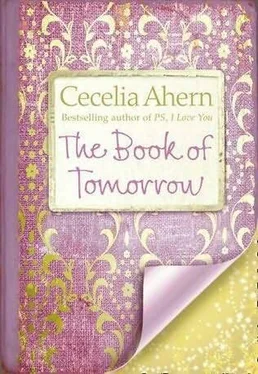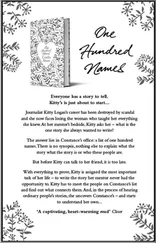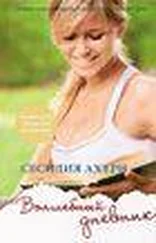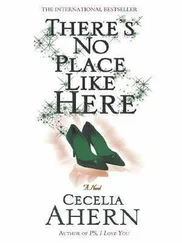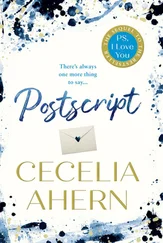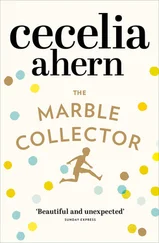‘He has to be!’ she shrieked. ‘He has to be. He always locked his bedroom door when he went to the workshed.’
‘Who?’ the garda was saying over and over again. ‘Who’s in the house?’
‘He’s not there.’ Arthur’s voice was hoarse. ‘My God, woman, what have you done?’
‘Oh my God,’ Rosaleen was shrieking over and over again. Her mother was softly crying.
Sirens were wailing in the distance.
I ignored them all. I ran past them unnoticed, down the side passage and in through the back door of the bungalow. Smoke was everywhere, filling the halls, so black and thick that as soon as I inhaled it I was choked. It sent me to my knees, retching and gasping, stinging my eyes so badly I rubbed them over and over but it only made them worse. I placed my cardigan across my face. I had soaked it in cold water from the outside tap and put it across my mouth and nose to help me breathe. Peering out from one eye, I felt my way along the wall. The plastic beneath my feet was dangerously hot and sticky, so that the rubber in my trainers was sticking to it. I kept to the sides of the hallway, where it was tiled. I felt my way along the wall to his bedroom door. When I placed my hand on the metal door handle it burned me so badly I let go and cowered over, cradling my hand, coughing, eyes stinging, retching, hand burning. The open door at the end of the hall relieved the hallway at least of some smoke and I knew it wasn’t far. I could always run out the door.
I shoved the key in the door, hoping the whole thing hadn’t melted, and I turned it. Stepping back, I used my foot to push down the handle and the door swung open. More smoke followed me in and I pushed the door closed. The corners of the photographs were curling with the heat. I couldn’t see any fire, just smoke, thick black heavy smoke that hurt my lungs. I tried to call out but couldn’t, just kept coughing over and over, hoping he’d hear me, that he’d know I was there.
I felt my way along the bed, felt his body, felt his face. His beautifully scarred face, ruined just like the castle, which carried such a story I was drawn to it and not repelled. His eyes were closed; I could feel his eyelids. I shook him, moved my hands all over his body to try to wake him. Nothing. He was unconcious. Behind me I felt intense heat, felt fire. It would quickly close in on me, in this room of photographs. I pulled at the net curtains, bringing a little light into the grey smoky room. I felt around to try to open the windows. They were locked. There weren’t any keys. I picked up a chair, threw it at the window over and over to smash it, but I couldn’t. I tried to pull at him, but he was too heavy. I tried to get him to his feet. I was getting tired, running out of energy, feeling dizzy. I lay down beside him, trying to wake him. I held his hand, the two of us huddled together on the bed. I wasn’t going to leave him.
Suddenly I dreamed of the castle, of a banquet with a long table filled with pheasant and pig, everything dripping with grease and sauces, wine and champagne, the most delicious duck and vegetables. Then I was with Sister Ignatius and she was shouting at me to push, but I didn’t know what to push. I couldn’t see her but I could hear her. Then the darkness faded and the room was filled with such wonderful light, and I was in Sister Ignatius’ arms. Then I was in the field of glass, running, running, with Rosaleen hot on my heels. I was holding Weseley’s hand just like before only it wasn’t Weseley, it was Laurie. Not as I knew him from today but as I first saw him in the photographs, handsome, young, mischievous. He was turning round and smiling at me, his perfect white teeth opening and closing as he laughed, and I realised then how alike we were, how I’d always wondered why I didn’t look like Mum or Dad, and now it all made perfect sense. His nose, his lips, his cheeks and eyes-all were like mine. He was holding my hand and telling me we were going to be okay. We were running together, laughing and smiling, not worried at all about Rosaleen because she couldn’t catch us. Together we could outrun the world. Then I saw my father, at the end of the field, clapping and cheering us on as though I was a child again, at the community races in the rugby club. Laurie was gone and it was me and Mum for a moment, legs tied together in the three-legged race, just like we used to do when I was young. She was anxious-looking, not laughing but worried, and then she left and Laurie was back. We were running, tripping up, and there my dad was, laughing and cheering, beckoning us forth, arms open and ready to catch us when we fell across the line.
Then the glass mobiles in the field exploded all around us, shattered into millions of pieces and I lost Laurie’s hand. I heard Dad scream my name and I opened my eyes. The room was filled with glass, it was all over our bodies, all over the ground and the smoke was pluming out through the window. I saw a claw, a giant yellow claw, disappear through the glass and the smoke drifted out. But it didn’t stop the fire. It ravaged the photographs, racing through them with such speed and ferocity it was eating away at everything around us and leaving us until last. We would be next. Then I saw Arthur. I saw Sister Ignatius. I saw my mother’s face, alive, present, terrified. She was outside, moving, talking and, despite her alarm, I was relieved. Then there were arms around me and I was outside, coughing, spluttering. I couldn’t breathe, I was on the grass. Before I closed my eyes I saw my mother, felt her kissing my head, then saw her embracing Laurie, crying and crying, her tears falling onto his head as if they alone could put out the fire between them.
For the first time since I’d found my father on the floor of his office, I exhaled.
Little Girl
Once upon a time there was a little girl who lived in a bungalow. She was the youngest child, with an intelligent older sister, and cute older brother so handsome that he turned heads in the street, invited conversations with strangers. The little girl was what some people would call a surprise baby. To her parents, who had long finished having children, she was not just unplanned but unwanted and that she knew well. At forty-seven years old and twenty-two years since she’d had her last baby, her mother was not prepared for the arrival of another child. Her children had grown up and moved away, her daughter Helen to Cork to be a primary school teacher and her son Brian to Boston, where he was a computer analyst. They rarely came home. It was too expensive for Brian, and her mother preferred to go to Cork for holidays. The little girl didn’t know these two strangers she rarely met and who called themselves her brother and sister. They had children older than she; they knew little of who she was or what she wanted. She’d arrived too late, she’d missed the bonding that they had all had together.
Her father was the gillie at Kilsaney Castle grounds, which was across the road from her home. Her mother was the cook. The little girl loved the position her family were in, so close to such grandeur that the children at school considered her to be a part of it too. She loved that they were privy to bits of gossip that nobody else was. They were always the benefactors of great Christmas bonuses, leftover food, fabrics or wallpapers from recent refurbishings or clear-outs. The grounds were strictly private but the little girl was allowed to play inside its walls. It was an absolute honour for her and there was nothing she wouldn’t do to please the family, such as odd jobs around the house, running from her father Joe to the groundsman, Paddy, with messages from her mother on what to catch that day, what vegetables to choose for dinner.
She loved the days she was allowed to enter the castle. If she was off sick from school her mother couldn’t very well leave her at home. They were good like that, Mr and Mrs Kilsaney. They allowed her mother to bring her child to work, knowing there was nowhere else she could possibly leave her child and there was nobody else who could take care of their three meals a day so well, feeding them so well with money that was lessening by the year. The little girl would remain quiet in the corner of the great big kitchen where she’d watch her mother sweat all day over steaming pots and a roaring Aga. She would be quiet, never giving any trouble, but she’d take it all in. She’d take in her mother’s cooking but also she absorbed the goings-on in the house.
Читать дальше
Конец ознакомительного отрывка
Купить книгу
